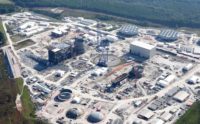PSC Finds S.C. Utility Withheld Information About Failed Nuke Project

The South Carolina Public Service Commission ruled Jan. 14 that South Carolina Electric & Gas representatives withheld “material, and even potentially decisive, information” from state officials during their management of the now-abandoned V.C. Summer nuclear project. The finding comes one month after the PSC approved Dominion Energy’s purchase of SCANA Corp., the parent company of SCE&G.
In what the PSC called a “clear and unequivocal finding,” the commission found SCE&G acted “imprudently by not disclosing material, and even potentially decisive, information to ORS (Office of Regulatory Staff) and the Commission.” Additionally, “Due to the lack of transparency—the lack of forthrightness—with regard to reports and studies available to the Company, this Commission was effectively denied the opportunity to fully consider the prudency of continuing to expend resources on the project with all information available at the time. Under any definition of the term prudence, the Company was imprudent in its actions in this case with regard to costs incurred after March 12, 2015.”
In cost-recovery cases involving utilities, hearings are held to determine if capital construction costs were incurred prudently. If a governing body determines that a utility incurred certain costs imprudently, it can prevent the utility from recovering those costs through its electricity rates. After holding hearings in November into the costs of the abandoned plant, the PSC initially decided not to determine whether costs were incurred prudently. That's because the issue of SCE&G’s prudency “became no longer legally relevant” to the PSC after the utility agreed to not seek further recovery of costs incurred after March 12, 2015. Also, in late November, the utility had settled a class action lawsuit with the state of South Carolina. The settlement returns roughly $2 billion to ratepayers. The project was abandoned in July 2017.
Nevertheless, several parties to the case involving SCE&G petitioned the PSC to rule on the whether SCE&G acted prudently.
“We believe it is of vital importance that a legal finding of imprudence on the part of the utility be issued not just to satisfy the law but to send a message to all utilities regulated by the PSC that statutory compliance, transparency and accountability are requirements that cannot be violated without penalty,” said Nanette Edwards, executive director for ORS, in a statement on the PSC's determination.
At November’s hearings, led by the ORS, Carlette Walker, SCE&G’s former vice president for nuclear finance administration, testified about “management's lack of involvement in the project and the site management’s willingness to accept the consortium’s excuses and substandard work products.”
Another witness, Kenneth Browne, a former engineer with SCE&G, also testified that SCANA execs failed to properly inform the PSC of the project's status.
A federal investigation into whether SCE&G executives misled investors is reportedly ongoing. Additionally, the PSC’s Jan. 14 ruling rejected motions by other intervening parties to add further financial penalties to Dominion’s purchase of SCANA Corp. Dominion announced its completion of the merger on Jan. 2. The ruling has no effect on Dominion’s acquisition of SCANA or on the operations of either company.
“It is a positive step that the PSC made the determination of imprudence, which we called for, but the revised decision does nothing to alter the fact that an additional $2.3 billion in costs have been placed on the backs of SCE&G customers,” said Tom Clements, who formerly represented Friends of the Earth, one of the intervenors.
In response to ENR’s request for comment, a spokesperson for the utility stated: “We are enthusiastic about the future of our new combined company and remain focused on delivering the benefits of the merger to our customers and communities.”




